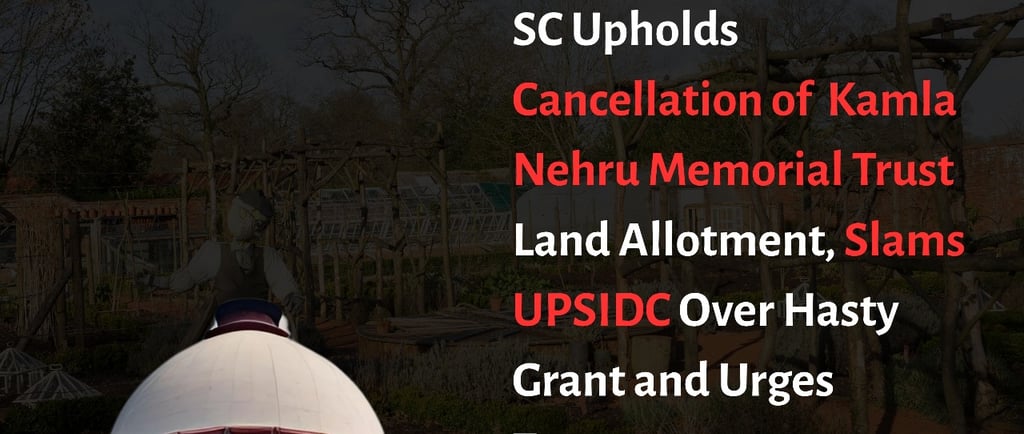SC Upholds Cancellation of KNMT Land Allotment, Slams UPSIDC Over Hasty Grant and Urges Transparent Allocation
New Delhi, May 30, 2025 — In a landmark ruling addressing both contractual fairness and the constitutional obligation of transparency in public resource allocation, the Supreme Court of India dismissed the appeals filed by the Kamla Nehru Memorial Trust (KNMT) against the Uttar Pradesh State Industrial Development Corporation (UPSIDC) and upheld the cancellation of a 125-acre land allotment in Jagdishpur, Sultanpur district. The apex court also invalidated a subsequent allotment of the same land to M/s Jagdishpur Paper Mills Ltd, citing violations of public trust and calling for reforms in industrial land distribution.
6/2/20253 min read


KNMT, a charitable trust established in 1975, had applied for land allotment in 2003 for the purpose of developing floriculture projects. UPSIDC allotted 125 acres of land via a letter dated September 18, 2003, with conditions requiring timely payments and document submissions. However, the trust failed to deposit the reservation money within the stipulated time, leading UPSIDC to grant an extension with an interest levy.
Over the years, despite assurances and rescheduling of payments by UPSIDC, KNMT repeatedly defaulted on payment schedules, citing issues like non-demarcation, alleged encroachment, and failure to receive physical possession. UPSIDC, after issuing several notices, ultimately cancelled the allotment on January 15, 2007.
Protracted Litigation
KNMT approached the Allahabad High Court, which initially ruled in its favour in 2009 and directed restoration of the allotment, conditional upon compliance. UPSIDC challenged that verdict in the Supreme Court, which remanded the matter back for adjudication on merits. In subsequent hearings, the High Court ruled in favour of UPSIDC, validating the cancellation. KNMT then appealed again, leading to the present ruling by the Supreme Court.
During this period, UPSIDC also allotted the same land to M/s Jagdishpur Paper Mills Ltd, prompting KNMT to file a second writ petition. The apex court stayed the High Court’s order in 2017, and both cases were heard together.
Supreme Court’s Observations
The bench comprising Justice Surya Kant and Justice Nongmeikapam Kotiswar Singh delivered a comprehensive judgment addressing two key questions:
Whether UPSIDC was responsible for frustrating the contract by failing to hand over possession; and
Whether the cancellation of allotment was legally defective.
On Contract Frustration
The Court found no merit in KNMT’s claims of contract frustration. It ruled that the Allotment Letter clearly stated that possession would be handed over only upon execution of the lease deed. Evidence showed that demarcation was conducted on March 3, 2005, and KNMT acknowledged this in writing. Additionally, UPSIDC had acquired the land, completed compensation formalities, and provided a site plan, disproving the allegations of encroachment and ambiguity.
The Court stated, “Our examination reveals that none of the alleged acts—non-demarcation, removal of encroachment, or non-delivery of possession—constitute conduct that would frustrate the performance of the allotment terms.”
On Procedural Validity of Cancellation
On the second issue, KNMT argued that UPSIDC failed to follow Clause 3.04(vii) of its Manual, which mandates issuance of three consecutive legal notices before cancelling any allotment. While KNMT admitted that the 2006 notice qualified as a legal notice, it contended that no other notices met that criterion.
The Court rejected this argument, stating that previous correspondences dated December 2004 and 2005 also met the essential requirements of legal notices. It observed that a legal notice must clearly communicate the facts, cite contractual breaches, and indicate the legal consequences of non-compliance.
“Merely because the notices were not captioned as ‘legal notices’ does not deprive them of their legal character,” the Court held.
It further rebuked KNMT for chronic non-compliance and noted that their repeated attempts to seek concessions and waivers of interest despite multiple opportunities from UPSIDC indicated a pattern of deliberate delay.
Invoking the Public Trust Doctrine
In a significant segment of the judgment, the Court invoked the Public Trust Doctrine to critique both the original allotment to KNMT and the subsequent grant to Jagdishpur Paper Mills. It highlighted how UPSIDC had initially allotted 125 acres to KNMT just two months after application, without competitive bidding or rigorous evaluation of public interest impact.
Quoting M.C. Mehta v. Kamal Nath and the 2G spectrum verdict in Centre for Public Interest Litigation v. Union of India, the bench emphasized that public resources must be allocated transparently, fairly, and in furtherance of public interest. It held the allotment to both KNMT and Jagdishpur Paper Mills as violative of this principle and annulled them.
“The failure to adopt transparent mechanisms not only deprived the public exchequer of potential revenue—as evidenced by the substantial appreciation in the value of such a large tract of land—but also created a system where privileged access supersedes equal opportunity,” the Court observed.
Directions for Future Allotments
Recognizing systemic flaws in UPSIDC’s allotment process, the Supreme Court directed the Government of Uttar Pradesh and UPSIDC to ensure that all future land allocations are conducted in a “transparent, non-discriminatory and fair manner,” with emphasis on public benefit, revenue maximization, and industrial development objectives.
Final Disposition
The appeals by KNMT were dismissed, with the Court upholding the cancellation of the 2003 allotment. It also quashed any subsequent grant to Jagdishpur Paper Mills Ltd, directing that any payments received be refunded with applicable interest. While no cost was awarded, the Court issued binding directives to reform future public land allotment procedures.
Implications
This judgment has far-reaching implications for industrial development policies in India. It serves as a reminder to state agencies to adhere strictly to procedural fairness and uphold constitutional mandates in allocation of scarce public resources. It also places renewed emphasis on the role of public bodies as fiduciaries, obligated to act in public interest and not merely as contractual entities.
With this ruling, the Supreme Court reinforces its position as a watchdog of public accountability and resource stewardship, and it sets a compelling precedent for transparent governance in land and infrastructure development.
